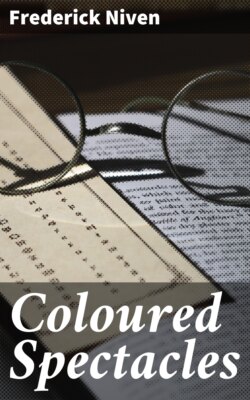Читать книгу Coloured Spectacles - Frederick Niven - Страница 13
X
ОглавлениеThe other day I met a lady who deplored that I do not play bridge.
"What will you do in your old age," she asked me, "if you do not play bridge?"
I left it at that, trying to look doleful about my old age. I shall probably, in memory, row a boat out of Millport till I arrive at that glint upon the face of the waters, off Fairlie, that signifies the sandbank there, and fish for flounders again; or climb Goatfell with the heart and wind of youth, tack a lug-sail in Kilchattan Bay and often visit, propping my old head with a withered hand, a certain little seaport on the Clyde.
The Queen Mary could not have come within a mile of the harbour. The ships that lay by its old wharf were of a draught not much deeper than that of the vessels in Columbus's fleet. There were a couple of comparatively modern derricks, and there was a highly modern contraption for loading coal into the gobarts, or the vessels that were in direct descent from the coal-gobarts, a great steel fist that opens as it drops into trucks, closes there and swings up full, with just a sifting of black dust between the knuckles.
But there was also much loading and unloading done there by devices as simple as those the Phœnicians knew. A rope, a pole, a pulley, and a basket served the turn of the sailors of most of the smacks, men who looked as though they belonged less to any given country than were simply descendants of sea-rovers. Some wore little gold ear-rings. Their sheath-knives, on hip, might have been bought of some water-front ship chandler at Greenock, some little quay-side fournisseur de navire at Quimper, or in one of their own little dusky stores across the cobbles.
Before the railway came it had been one of the chief ports of Glasgow, ships from Jamaica and Virginia unloading their sugar and tobacco there, and the carriers' carts coming and going. Ghosts of my ain folk trod its planestanes. My mother's father and his father before him (with John Galt's pawky eye on him) had expounded the gospel in sermons—doctrinal, experimental, and prophetical—preached from pulpits in that port. To see my great-aunts there—Janet and Margaret Barclay—Daniel Macmillan (who founded the Macmillan publishing house in London) often went, a hundred years ago. "I say all manner of out-of-the-way things," he wrote to his brother Malcolm, "just to pester them. Is that not amiable? It is such fun to see them open their eyes." They often played to him as he lay on the sofa in their drawing-room. "This does me more good than all the doctors," said he.
Edgar Allan Poe went to school there, strange though that might seem. He, I am sure, would be aware of the rooks, before sunset, cawing overhead from the foreshore to their tree-top villages inland.
With aeroplanes crossing the Atlantic, and liners like hotels (on which one feels inclined to say "waiter" instead of "steward" at table), and the cargo boats of to-day like liners of yesterday, doing their fourteen knots, fitted with wireless and all modern conveniences, my little seaport seems very near to Homer's sailors, to Jason, to Odysseus. The men I saw there were very definitely in the succession from Hakluyt's originals. Fishing boats, with their shining load, tacked in and lay alongside, and the fishermen peddled their catch through the town in barrows.
Much of the basic simplicity and directness of life remained. Along the water-front the marine stores displayed iron bolts and nuts in the windows. Seamen's boots and yellow and black oilskin coats hung gleaming at the doors. The interiors were dark, with flicks of brasswork reflecting light—ship's lanterns, gimbals with their screws, or the locks on sea-chests. The smell was of tar, of ropes, of tarpaulins and paints, of seaweed and the light off the sea flickered over the houses facing the wharf.
Two streets away was the railway station, and beyond it the town had a different feeling. Farmers' traps stood at hotel doors with pigs or hens under nets behind the seats. Herds of cows went scliffing and joggling past, driven by red-faced lads in corduroy or moleskin. The men in the blue jerseys seldom came so far inland from home. Even those who were old lived where they could see the little ships come in, see, from the window, a red sail or a pointing bowsprit. They must be able to hear a "yo-ho," or the clatter of a capstan, or the chirping of blocks (that seaside sound so quaintly in tune with the shrill piping note of a herring-gull) that tells of the tide being at turn and the smacks preparing for sea.
